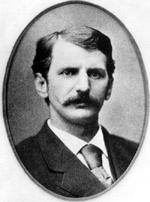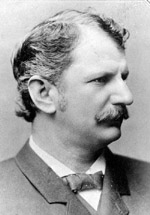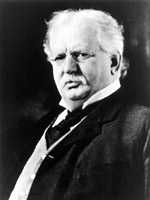 "Alexander Graham Bell invented the telephone and Theodore Vail
invented the telephone business."
"Alexander Graham Bell invented the telephone and Theodore Vail
invented the telephone business."
Theodore Newton Vail was born on July 16, 1845, in Carroll County, Ohio.
Vail was a dreamy boy and a great reader and, in his early adulthood,
had trouble sticking to any one career. According to Albert Bigelow
Paine, in his 1921 biography of Vail,
One Man's Life, "His father
more than once declared that he expected to have to support him."
He went to work for the U.S. Postal Railway System as a mail clerk. From
the very beginning on this job, he began to develop the mail delivery
system used to this day by the U. S. Postal System. His system allowed
mail to be delivered up to two weeks earlier than was done before. He
initiated schematic distribution in the West, and within 6 years
expanded the system to include the vast network of rails throughout the
country. Perhaps the finest tribute to Vail was that his success was met
with almost no resentment or jealousy, but rather an outpouring of
sincere warmth and congratulations from peers and coworkers. They felt
"he faithfully earned the laurels won, and hoped to hear of his
continued recognition, believing he belonged further up the scale."
The American Bell Company
In 1878, Vail became the General Manager of the fledgling Bell Company,
joining the other officers, which consisted of Gardiner Hubbard
(President), Thomas Sanders (Treasurer), Alexander Graham Bell
(Electrician) and Thomas Watson (General Superintendent).
Mergers and buyouts were the order of the day, just as they are
currently. Thomas Edison had sold his transmitter (far superior to
Bell's) to Western Union, which had designs on buying the American Bell.
However, a young inventor, Francis Blake, Jr., came up with an even
better transmitter and sold the rights to Bell. In a dramatic turnabout
(you can read more in our
"Patent Follies" article), Bell bought Western Union and began to
offer both telephone and telegraph service. The name of the company was
changed to The American Telephone and Telegraph Company, or AT&T.
As technology evolved, copper wire became the conductor of choice, the
bell was established as the signaling device and clear, static-free
conversations became the norm. Vail himself held a dozen patents. *

At age
forty, Vail resigned as General Manager of American Bell to become the
first President of AT&T. Theodore Vail had the philosophy that customer
service--not increasing dividends--was the most important thing to a
corporation. His policy and vision was always larger than current minds.
Universal service and commitment to the customer were his policies. AT&T
was almost certainly the first large private organization to adopt a
conscious, clearly articulated policy of subordinating the maximization
of profit to the provision of service, a milestone in industrial
history.
Two years later he resigned from AT&T because of escalating
disagreements over service improvements versus short-term financial
gain. Vail was unable to convince his Board of the value of "service
first."
Vail Returns
Twenty years later, Vail was asked to return as President. During his
hiatus, he had developed electricity from waterpower in South America,
financed a gold mine in Colorado and invested in electric tramlines.
Vail had left the company in its youth; he now found a great and
wallowing giant, needing to be set on its feet.
During his absence, the company's directors had viewed their mission as
being to milk the Bell Patents for all they were worth until their
expiration. The attitude had become one of an elitist monopoly doing the
public a favor. When the patents expired and the Bell Company was no
longer a monopoly, the trouble really started.
"Independent" companies (those in smaller towns and on farmer's lines
where the Bell company had no service) were now able to compete directly
in those areas where Bell had held a monopoly. This ushered in a
confusing, chaotic era of two or even three companies in the same area.
In order for customers to speak to all others in their own town, it was
often necessary to have 2 or three separate telephones and lines.
Because of their cavalier attitude, Bell was not always the favorite
company among these customers. They were beginning to lose ground. Vail
was just the man to help AT&T make the necessary hard decisions and to
begin to turn the company around. The first thing they needed was a
clear sense of purpose and mission. He set about implementing his
strategy to achieve a single communication system offering the best
possible service.

He put an
end to the harassment of the independent telephone companies and made it
attractive for them to link up with Bell. He put new emphasis on
centralized control and standardization of apparatus, equipment and
operating methods. He announced the policy of candor and cooperation
with government regulatory efforts, determined that the telephone system
should remain in private hands. Finally, he established a firm financial
foundation for growth, by raising millions of dollars and redesigning
the AT&T stock offerings to appeal to investors interested in steady
income and growth.
He undertook a vigorous campaign of public relations, and was
responsible for the motto, "One policy, one system, and universal
service." He began advertising the story of the Bell System as an
institution representative of American life and the American Dream.
In June of 1919, he retired as President and became Chairman of the
Board. Vail was 74 years old when he died on April 16, 1920 at Johns
Hopkins Hospital in Baltimore. The
Vail medal was established in his memory in 1921, to award employees
"in recognition of unusual acts or services, which conspicuously
illustrate the high ideals which governed the policy of Mr. Vail."
Vail's legacy
Some of Vail's most important actions were:
- He developed pensions.
- He secured the company from government control during wartime.
- He played a large role in the founding of the Telephone Pioneers
of America, becoming its first President.
- He structured operating companies, laying out the geographical
boundaries of the Bell Companies.
- He helped create, and listened in on, the first transcontinental
telephone conversation.
- He was a founder of the Junior Achievement program, that is
still teaching our youth how to operate a business.
His advice to employees still resonates:
- No business talk after six o'clock.
- Tranquil thought is always needed.
- Refuse to be hurried.
- Love your work and have pride in it.
- Be courageous--state both sides of an issue openly.
- Never let 'em know if you are worried.
- Service improvements are more important (and lucrative) than
short-term gains.
- If we don't tell the truth about ourselves, no one else will.
* 5 for signaling apparatus, 3 for circuit-closing devices, 3 on
switchboards and 1 on subterranean conductors.
From the Vail exhibit in the
Telephone Museum of New Mexico in Albuquerque, by Susie Turner
Links to more
See more facts about Theodore N. Vail and the events surrounding this
story at the following links: